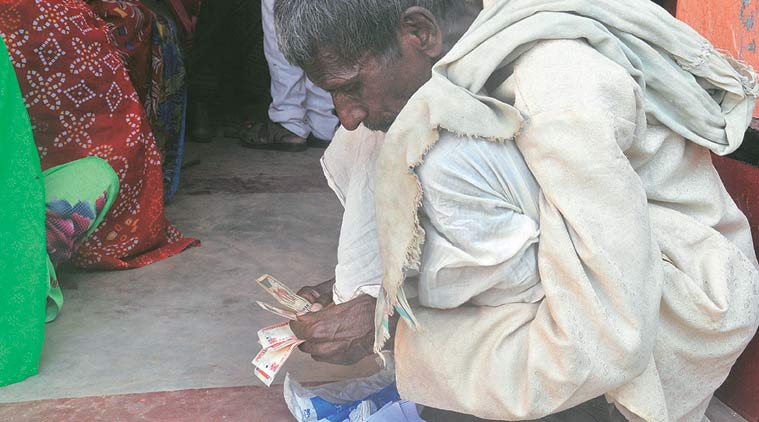- India
- International
Bihar: In Jamui’s Maoist-hit panchayat, some cash trickles in
But two bank branches and an ATM nowhere near adequate for the block; paddy buyers can pay only 10-20% to farmers
 At a bank at Rampur village in Jamui district. (Express Photo by Prashant Ravi)
At a bank at Rampur village in Jamui district. (Express Photo by Prashant Ravi)
Bhutak Manjhi’s thumb impression did not match with the sample thumb impression in her biometric account with State Bank of India’s (SBI) customer service point (CSP) on Friday. The result: the 55-year-old from Rampur village, under Harla panchayat of Jamui district in southeastern Bihar, bordering Jharkhand, has to now travel to the block town of Laxmipur 4 km away to withdraw Rs 2,000.
Manjhi, who earns her living by working on fields or by doing petty work, said she doesn’t have the courage to go to Laxmipur, as people start gathering before the SBI branch there from 2 am, although the area is in the middle of a Maoist-affected zone.
There are two bank branches and an ATM for the entire Laxmipur block.
Unlike Manjhi, many other women in queue at the SBI CSP in Rampur got money. The CSP-holder, Rajkumar Yadav, said the main branch gives him cash only against deposits received through old notes. Deposit in a day is not more than Rs 50,000. On most days before November 8, Rajkumar hardly dealt with any crowd. Since then, he has become no less than Santa Claus to the villagers — he gets between 80 and 100 customers daily, and has to return 20-odd people every day empty-handed.
Handed a Rs 2,000-note, Rukmini Devi looked puzzled, but smiled at the “small size” of the new currency. “Paisa mil gaya, lekin is gaon mein ise change kaun karega (I have got cash but who will give me change in this small village),” she asked. Her husband, she added, earns Rs 300 per day.

Savitri Devi, who has not bought grocery for a week due to cash shortage, said her family is cooking vegetables without haldi (turmeric).
About the government’s decision to scrap big notes, Uday Manjhi, a daily wage labourer, said, “Those who are destined to deal in notes of Rs 50 and Rs 100 (the poor) have nothing to complain. We have heard it is a good decision.”
Harla panchayat, 15 km from Jamui, is located at the entry point of the Laxmipur jungles, infamous as a Maoist hideout. Robberies are common on the 8-km road through the jungles, connecting to Kharagpur and other Munger towns, despite police patrol.
Harla villages have to depend on Laxmipur or Jamui to withdraw notes. “There is no question of crossing the jungles to visit Kharagpur or Tarapur to withdraw cash,” Murari Prasad Singh, a retired postal department employee, emphasised. “So dozens of people leave for Laxmipur after 1 every night to stand in queue at the only bank and its ATM,”
Farmers selling just-grown paddy, meanwhile, are getting only 10 or 20 per cent of the amount due, with buyers keeping record of dues. Nandlal Sah, a paddy buyer, said, “I get one person to stand in queue at a bank and another person works on field — every day. We give some money to farmers against paddy purchase so that they can buy seeds for the rabi crop.”
Vishwanath Sah, a provision store owner catering to four villages of the panchayat, said: “My business has gone down by 50 per cent since the note ban. I have sent back three or four people who came to buy provisions with the new Rs 2000-note. I have sold on credit, but there has to be a limit to it.”
Sah said people are coming to buy only essential grocery items. Hardly any child has come to buy toffees in the last few days, he said.
Must Read
Apr 19: Latest News
- 01
- 02
- 03
- 04
- 05






































